News
Fantasia 2020: Brea Grant on ’12 Hour Shift’, ‘Lucky’, and the Love of Genre
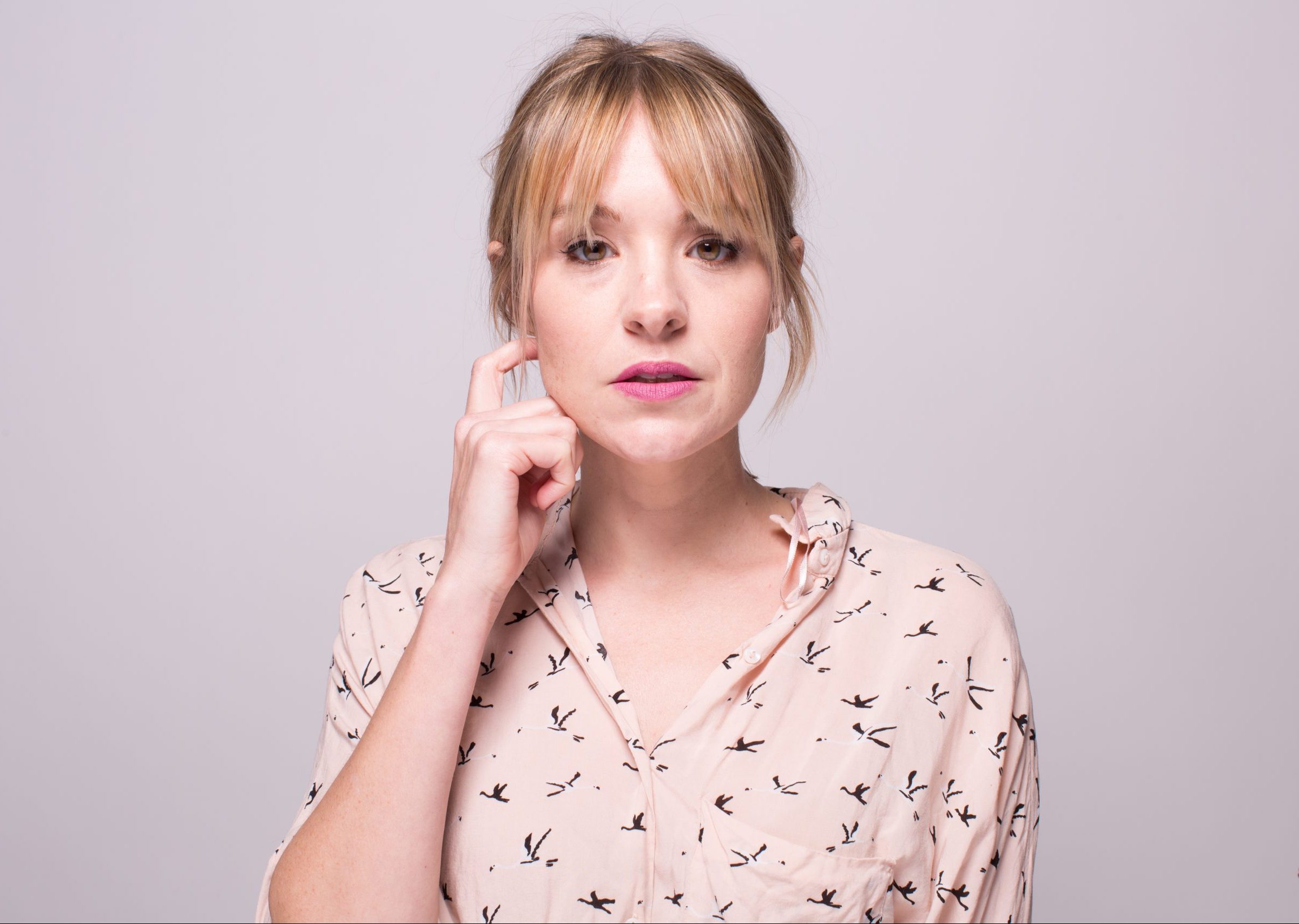
Brea Grant is perhaps best known for her work as an actress (Beyond the Gates, Heroes, Dexter, After Midnight), but she’s proven herself to be a talented writer and director with a flair for genre cinema. At this year’s Fantasia Film Festival, she had two substantial projects premiering — 12 Hour Shift and Lucky.
12 Hour Shift — which Grant wrote and directed — is a darkly comedic organ heist film set in a dingy Arkansas hospital in 1999. The film stars genre favorite Angela Bettis (May, The Woman) and Chloe Farnworth (Departure), with David Arquette (Scream) in a stellar supporting role.
For Lucky, Grant wrote the script and plays the leading role. It’s a biting exploration of societal reactions of violence against women, spun through a satirical lens (you can read my full review here).
I had a digital sit down with Grant at this year’s Fantasia Festival, where we discussed her two festival-favored projects, the 90s, horror tropes, and her love of genre.
Kelly McNeely: So with 12 Hour Shift, you’ve got this amazing sort of organ harvest heist movie, which is such a cool concept for a movie, I love that it’s a dark comedy as well and that it’s got these really strong female leads. What was the genesis of that movie? What were your inspirations and influences when writing and directing?
Brea Grant: I feel like movies sort of end up coming from just so many sources, and I wish there was one specific one, but the ones that I’ll kind of throw at you, are I love urban legends from the 90s. I always loved the one about the person who woke up in their bathtub with their kidney missing, and someone had written on the mirror, like, “go to the hospital immediately”. And you know, the weird thing about growing up in a small town is you hear these urban legends, and I’d get convinced that it was something that happened in my small town, like I thought that that was a true story that happened in Marshall, Texas. So I think I’ve always kept that with me.
And this is sort of my story of what happened to that kidney, or why that kidney was missing — sort of a weird fucked-up version of that story. I think that and then also just, I’m from a small town, I’ve always wanted to write a crazy, wild story that has a lot of characters that remind meof people I grew up with. And I think those are the two main things that kind of got it going.
Now, with that urban legend again, from the 90s, was that one of the reasons why you wanted to set it in 1999?
Yeah! And also, I was a teenager in the 90s, and when I was writing the story and it was taking place in my town, it made more sense for me to kind of think of the town as I knew it. Because I haven’t lived there since I was 18, and I haven’t lived in Texas in almost 10 years. So, for me, it was about writing about the south and stuff and the small town worlds, but the way that I sort of know them.
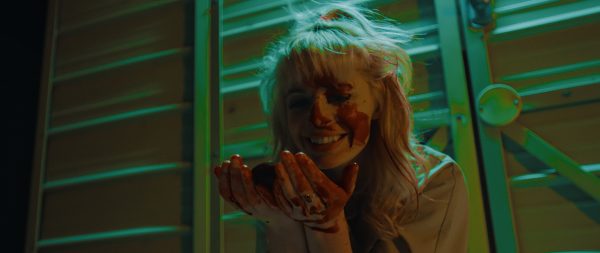
12 Hour Shift
I love that it’s got these really strong, powerful women in leading roles, because you don’t really see a ton of movies that have women in their 40s leading the show, which I think is a really fantastic choice. Was that something that you’ve had in mind when writing the script, or did that sort of come about in casting?
Thank you for noticing, no one has brought that up to me! You know, now that I’ve done a movie with two of my three main actresses being in their 40s, it’s all I want to do! [laughs] Because they’re so experienced, and they just take everything both seriously but also can really roll with the punches in an interesting way. I mean, Nikea Gamby-Turner, it’s one of her first leads in a movie and she was so wonderful and she just has a great aura on set, like she just brings so much happiness to set, and she’s a cancer survivor, and sort of everything she does she kind of takes with this, like a grain of salt, but really appreciates it at the same time.
With the writing, no! Actually the character of Mandy, when writing, I thought I might play her. But as we got closer to production, and we got greenlit, I wanted to really focus on and make sure the movie was the best possible movie I can make. And I know that unfortunately, when I’m acting, my directing suffers, and vice versa. And I’ve always been a fan of Angela’s and so when I decided not to be in it, we reached out to her. So it was actually written closer to the age of the Regina character, where they were about the same age. But now that I’ve done this, I’m telling you, like all I want to do is movies about women in their 40s and 50s. [laughs]
I love it too, especially set in the 90s. I feel like there is a bit of an edge to the 90s that really comes through in her performance, because, like, she’s just done with it, she’s just 100% done with it, and it reads so well, I think.
Yeah, it’s a bit of, like, the women that I knew in the 90s who were a little bit older than me, and they were so over it, and they all had that kind of hair that was, like, Maroon? You know, the Maroon 90s color? And I loved them so much. And they were so much more worldly than I was. I think that’s what Angela ended up embodying. And I think it super worked for this movie.
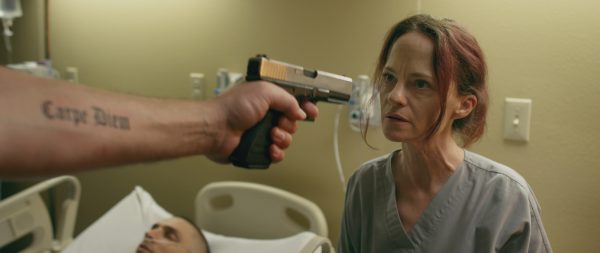
12 Hour Shift
Now Lucky, which I hear just got picked up by Shudder — so congratulations! — speaking of women and female roles, it’s very on-point in the way it discusses the relationships between women and other women, and women and men, that whole dialogue is really clever, I think. Where did the script come from? And what do you hope audiences take away from that film, because I feel like male and female audiences are probably going to nitpick at different little things and see different things out of it.
I think so, we had that response in test screenings where we were getting really different feedback. I actually never attended the test screens, but Natasha [Kermani, director] would send me all of the notes. And it was just really divided on gender lines of what their notes were, and the things they felt it needed or did not need. It’s a complicated movie, and I like that about it, that it has this complicated female lead, like 12 Hour Shift. I wasn’t trying to write a hero for either one, I wasn’t going for a Final Girl that makes all the right choices. I wanted to write these complicated female protagonists, and both are a little bit of an antihero in different ways.
I think people can take away from Lucky what they want. I mean, for me, I was kind of trying to write both a universal story about women and violence, violence against women, and the way that it is happening everywhere, whether or not you’re willing to see outside of your own world, if that makes sense. So the character of May is seeing all this very subjectively, and she reacts to it very subjectively, and a way that she thinks is the right way. And I wanted to show how maybe that is complicated. She doesn’t always make the best choices. She isn’t the most likable character, she has complications. And that is really interesting to me. I don’t think we have to have these perfect female leads when we’re watching movies.
Yeah, I think it’s more interesting to have these unapologetic female leads, because you don’t see that very often. In horror movies, there’s usually a little bit more complexities, but with the trope of the Final Girl, you don’t really see that Final Woman as much. Where she’s like, been through it, and she’s experienced more, and she’s not running around trying to save the kids. She’s running around saving herself and I really love that.
Okay, good. The trope of this nice virgin teenager I feel like I have seen, and I love those movies and I’m very grateful to horror for all of the amazing female protagonists that we have, I just wanted to do something more complicated.
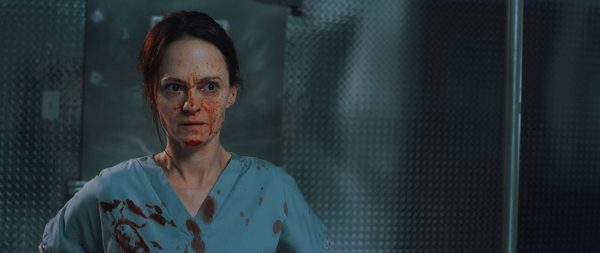
12 Hour Shift
Being a horror fan, as I know you are, when you were writing it did you kind of have in mind subverting those tropes? I think with the character of the Man as well, I really like that he’s not your typical — or stereotypical — slasher character. He’s not like this big, burly, scary guy. He’s just this guy. Did you have that in mind to play with those stereotypes a little bit when you were writing the script?
Well, the look of the man I have to give to Natasha. In the script, there was very little description. It was basically just that he wears a mask and you can’t tell who he is. But she came up with the idea that he was not a huge guy. He’s not Leatherface, he’s not someone that you can pick out of a crowd, which was really important, and he’s kind of more clean cut, which I do think is sort of scary, the more Hannibal scary side of things. But yeah, I was aware of all slasher movies. And I like slasher movies. But I didn’t want the movie to be about the man.
I think that what ends up happening in horror, and it’s not necessarily a bad thing, is that we watch Friday the 13th and Nightmare on Elm Street because we’re tuning in for Freddy Krueger, right? We’re tuning in for the bad guys, and I want people to tune in for the female lead instead of for this guy. It’s funny, when I was pitching it around, people were like, but how do we make the sequel? Because we have to make the Man someone we can recognize for the sequel, and we have to make him something, what is his next movie? And I’m like, he doesn’t get another movie [laughs] I don’t care about that guy.
I like that the man is different for each woman too, every woman has her own version of this guy, because I think we all do. There’s always like that person, you know?
Yeah, for sure. And I think if I had designed what the Man looked like for me, he would look like probably a different person than the one Natasha would design, and I think it all just comes from our personal experiences about what we’ve sort of maybe experienced when it comes to being a woman in the world.
Absolutely, yeah. Now you’ve done a lot of different roles between directing and acting, producing, writing; is there an area you’re most comfortable in, and is there an area you’d like to explore more?
Because I’ve just done so much acting, it is a place I’m quite comfortable in. I do feel challenged by it sometimes, but not as much as I used to, and I think me– just as a person — I’m always looking for a challenge. And I’m looking for the thing that scares me and the thing that will really push me to explore new parts of myself. So at this point in my life, I’m definitely leaning into the writing and the directing for different reasons. It’s interesting. COVID has really changed a lot of things. But the one thing I really like about where my career is, is that I spent quarantine writing. And I’ve gotten to work on some really cool projects, because I can do it from my laptop, which as an actor, obviously, you can’t do, and as a director, you can’t do really either — I guess unless you’re making that movie Host [laughs]. But yeah, I think comfortable acting, but the other stuff is feeling challenging, but also more fitting for my personality.
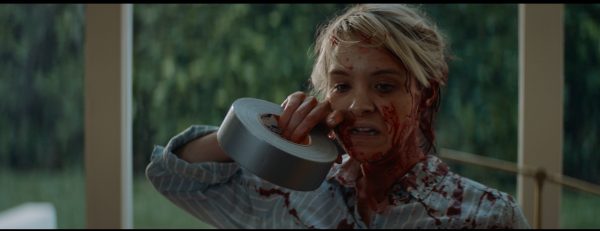
Lucky
Now again, as an actress playing this character that you wrote, when you were writing it, did you kind of have your own cadence and things in mind? Or does it sort of come out when you were acting in it? What was that process like, acting in a role that you’d written?
Well I didn’t write it for myself to be in, so I thought I might be directing it. I wasn’t sure. And I’ve had different actresses attached to it at different times before we made it. So I just always pictured a woman who had it together in a way that I never feel like I have it together [laughs]. So it’s so weird that I ended up playing this role. But when Epic wanted to make it, they came to me and they said, we would like Natasha to direct it and we’d like you to play the lead.
I did think about it for a while, if I wanted to do it, and I ended up deciding that would be a nice way for me to stay involved with a movie that I really cared about. Because I had written this character and created her, I didn’t feel like it was a huge stretch for me to kind of get into her skin. I think she’s very, very different than I am, and there are definitely days where I felt like I was bringing too much Brea into May, but I think overall it was a fun stretch for me, because I am often cast as like, somebody’s best friend or somebody’s girlfriend, and usually someone kind of bubbly, and this was obviously a little bit of a darker character.
You did a fantastic job with it. And she is very together, so when everything starts to unravel, it’s really interesting watching her dealing with that and coping with that.
Thank you. And you know, what’s so interesting, I found on the set, I had just directed 12 Hour Shift and then I went and did Lucky as an actor, and we spent a lot of time — Natasha and our costume designer, Brianna Quick, and I — looking at clothes. And that was the thing that really got me into the head of May, and Natasha’s vision for May is that her clothes are very specific. And I don’t think we use hardly anything of mine. And normally on indie movies, I bring a lot of my own clothes, and I end up wearing a lot of my own clothes. But I was wearing these clothes that are just not the kind of things I would normally put on my own body. I never wear a button up, ever, [laughs] and May loves a button up. But it helps me to really see May as a different kind of person than I am.
Now again, I know you’re a fan of the horror genre, and genre in general. Do you want to keep working and writing and directing genre films? Is that something you really enjoy doing?
Yeah! Yeah. It’s very fun to get to make stuff in the genre world because you can be really creative, and I think because it’s what I consume as a viewer, It’s what I’m always going to be writing and be drawn to. I think for me, I love the genre, I definitely add a lot of comedy to it. So I end up doing a lot of things that are satirical or horror comedy.
But my favorite thing to do is play with horror tropes. I love, I love that the horror audience has this collective knowledge of the tropes and the things that we’re doing. And I can use that collective knowledge and make something on top of that. That’s 100% what I want to be doing all the time. But I just came off directing a TV show that was science fiction, and I love sci-fi, I love big things in space, that is just this whole other thing. But it’s the same kind of stuff where you’re just getting to be imaginative. We’re just kids. We’re just kids getting to play what we like to watch.
One of the things I love about the horror genre is that it really feels like there are no rules. If you make a drama or comedy you kind of have to stick with a lot of “real world” rules. If there’s technology involved, you have to stick within those rules, but with horror you can throw that out the window and do as much as you want, and just kind of work it into the script, or you don’t have to work into the script, you can just make it not be a thing. And it’s really interesting how it gives so much creative opportunity.
Yeah, and I think the audience likes it, they like the creativity of all of it, and they like you to bend the rules a little bit. I like that aspect of the genre itself.
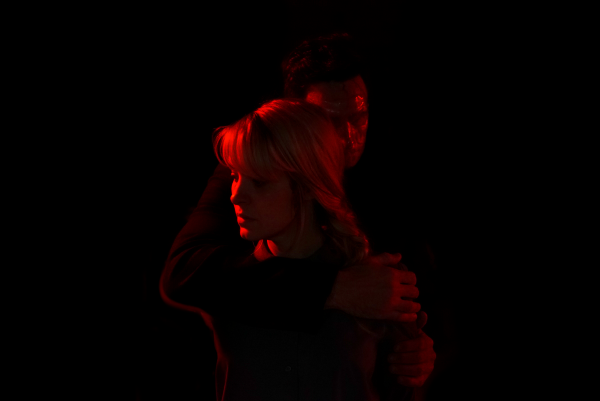
Lucky
Do you have a favorite horror genre or subgenre?
Yeah, I mean, what would you call that, the ones that are playing with tropes. Those are the ones that I tend to be drawn to. And horror comedy. I love a horror comedy and I love monster movies in any way shape or form. I kind of miss the Gremlins aspect of horror where they are the kind of “all ages” like cute monster, but I also love a straight up monster movie. One that I love is Attack the Block, which I think of as like a monster movie.
That’s one of my favorite movies!
Oh my god, it’s such a great movie. And because I think it’s hard to do it on a budget, they don’t get made as often. But I do really like them and the trope — I don’t know the name of this — like trope subversion horror. Like Tucker and Dale vs Evil, things like that, right? Like you’re playing with this collective knowledge. I love that.
Yeah! Dude Bro Party Massacre III is a really good example of that as well.
Yeah, that’s a good one! Yeah, yeah, yeah. Where you’re like “we know” and there’s a wink to the audience. I love a wink.
'Civil War' Review: Is It Worth Watching?
Follow our new YouTube channel "Mysteries and Movies" here.
Movies
Trailer for ‘The Exorcism’ Has Russell Crowe Possessed
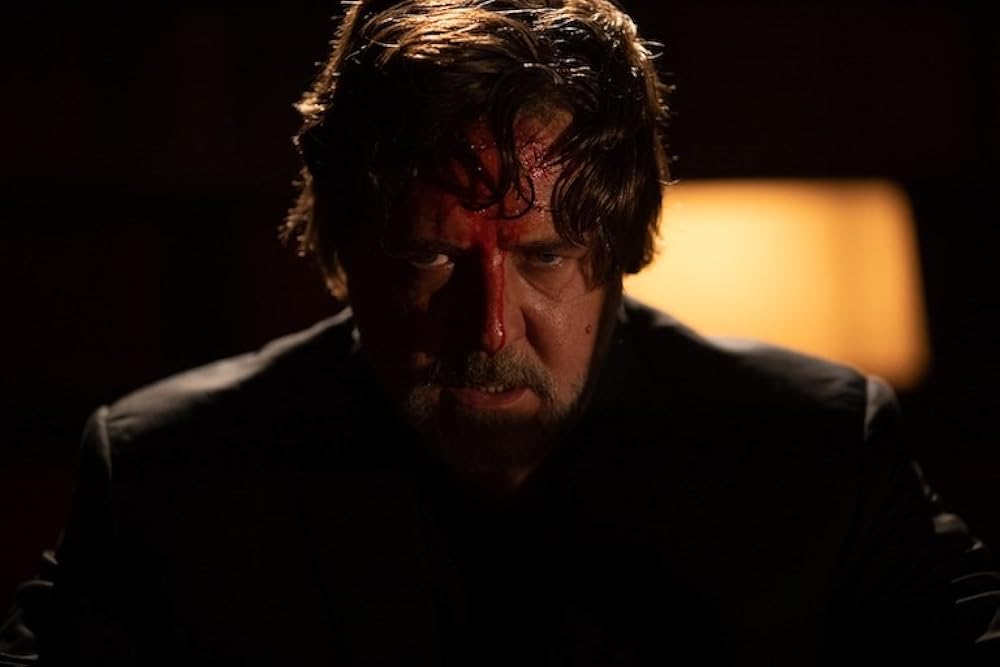
The latest exorcism movie is about to drop this summer. It’s aptly titled The Exorcism and it stars Academy Award winner turned B-movie savant Russell Crowe. The trailer dropped today and by the looks of it, we are getting a possession movie that takes place on a movie set.
Just like this year’s recent demon-in-media-space film Late Night With the Devil, The Exorcism happens during a production. Although the former takes place on a live network talk show, the latter is on an active sound stage. Hopefully, it won’t be entirely serious and we’ll get some meta chuckles out of it.
The film will open in theaters on June 7, but since Shudder also acquired it, it probably won’t be long after that until it finds a home on the streaming service.
Crowe plays, “Anthony Miller, a troubled actor who begins to unravel while shooting a supernatural horror film. His estranged daughter, Lee (Ryan Simpkins), wonders if he’s slipping back into his past addictions or if there’s something more sinister at play. The film also stars Sam Worthington, Chloe Bailey, Adam Goldberg and David Hyde Pierce.”
Crowe did see some success in last year’s The Pope’s Exorcist mostly because his character was so over-the-top and infused with such comical hubris it bordered on parody. We will see if that is the route actor-turned-director Joshua John Miller takes with The Exorcism.
'Civil War' Review: Is It Worth Watching?
Follow our new YouTube channel "Mysteries and Movies" here.
News
Win a Stay at The Lizzie Borden House From Spirit Halloween
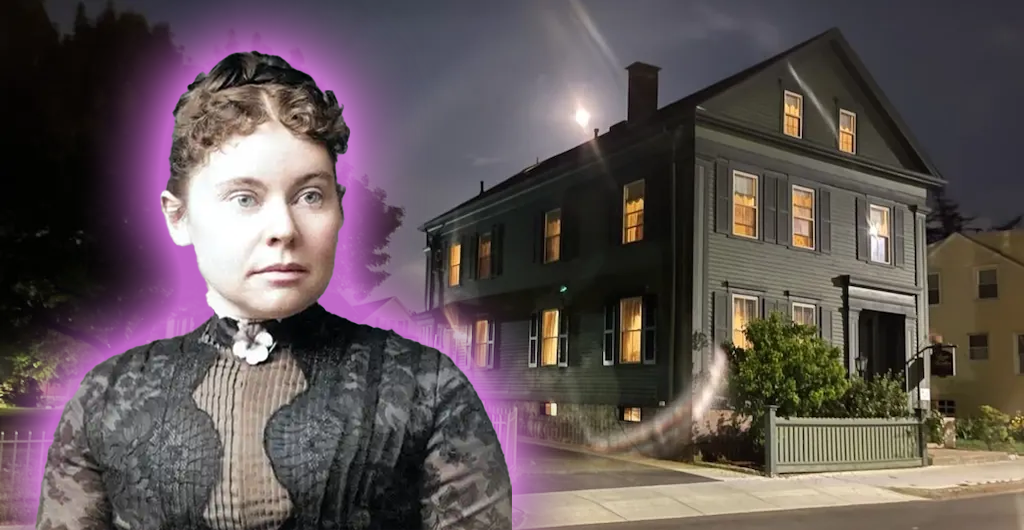
Spirit Halloween has declared that this week marks the start of spooky season and to celebrate they are offering fans a chance to stay at the Lizzie Borden House with so many perks Lizzie herself would approve.
The Lizzie Borden House in Fall River, MA is claimed to be one of the most haunted houses in America. Of course one lucky winner and up to 12 of their friends will find out if the rumors are true if they win the grand prize: A private stay in the notorious house.
“We are delighted to work with Spirit Halloween to roll out the red carpet and offer the public a chance to win a one-of-a-kind experience at the infamous Lizzie Borden House, which also includes additional haunted experiences and merchandise,” said Lance Zaal, President & Founder of US Ghost Adventures.
Fans can enter to win by following Spirit Halloween‘s Instagram and leaving a comment on the contest post from now through April 28.
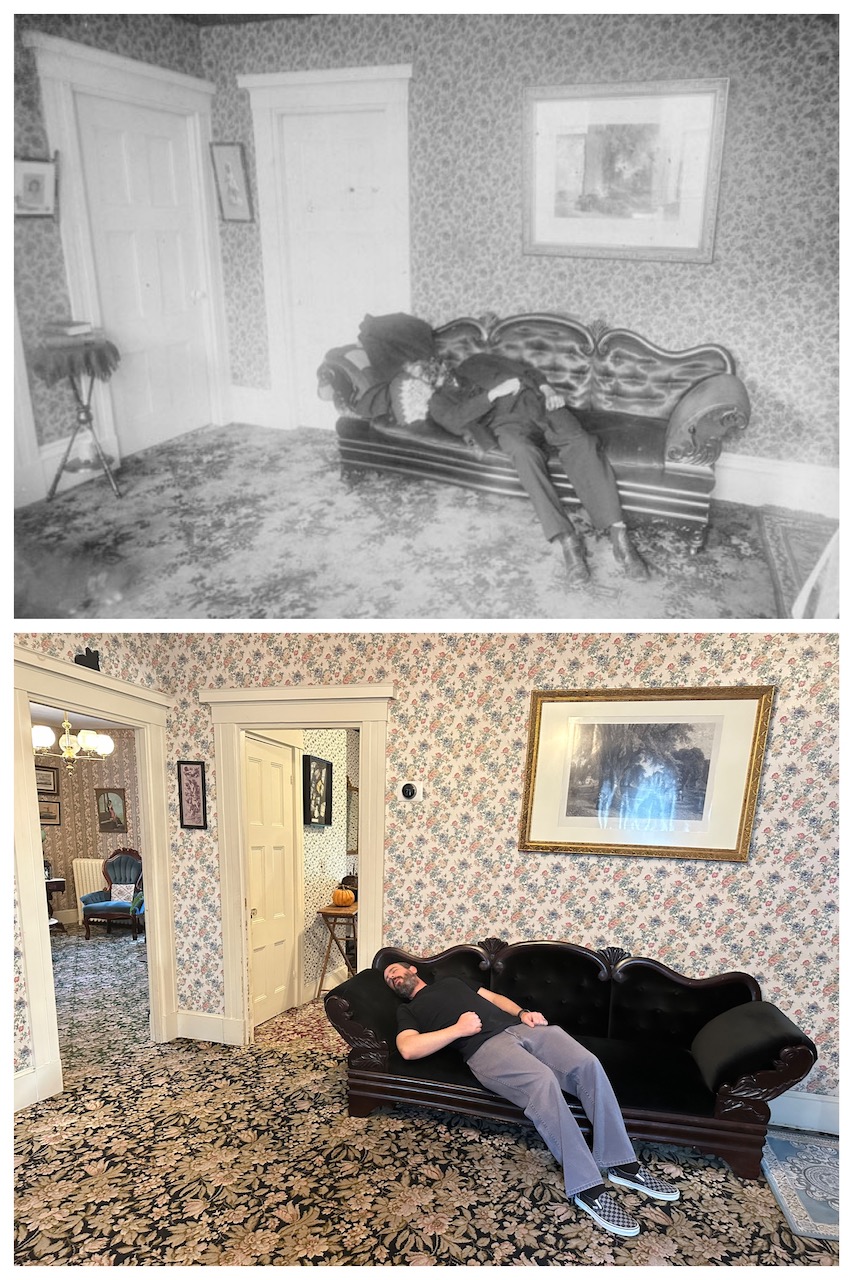
The prize also includes:
An exclusive guided house tour, including insider insight around the murder, the trial, and commonly reported hauntings
A late-night ghost tour, complete with professional ghost-hunting gear
A private breakfast in the Borden family dining room
A ghost hunting starter kit with two pieces of Ghost Daddy Ghost Hunting Gear and a lesson for two at US Ghost Adventures Ghost Hunting Course
The ultimate Lizzie Borden gift package, featuring an official hatchet, the Lizzie Borden board game, Lily the Haunted Doll, and America’s Most Haunted Volume II
Winner’s choice of a Ghost Tour experience in Salem or a True Crime experience in Boston for two
“Our Halfway to Halloween celebration provides fans an exhilarating taste of what’s to come this fall and empowers them to start planning for their favorite season as early as they please,” said Steven Silverstein, CEO of Spirit Halloween. “We have cultivated an incredible following of enthusiasts who embody the Halloween lifestyle, and we’re thrilled to bring the fun back to life.”
Spirit Halloween is also preparing for their retail haunted houses. On Thursday, August 1 their flagship store in Egg Harbor Township, NJ. will officially open to start off the season. That event usually draws in hordes of people eager to see what new merch, animatronics, and exclusive IP goods will be trending this year.
'Civil War' Review: Is It Worth Watching?
Follow our new YouTube channel "Mysteries and Movies" here.
Movies
’28 Years Later’ Trilogy Taking Shape With Serious Star Power
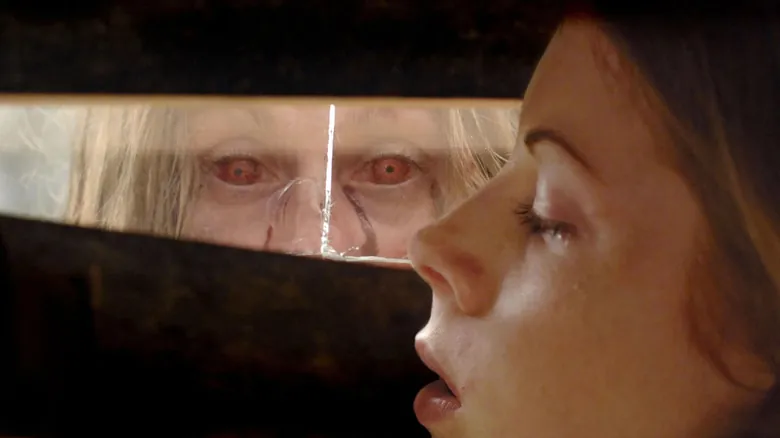
Danny Boyle is revisiting his 28 Days Later universe with three new films. He will direct the first, 28 Years Later, with two more to follow. Deadline is reporting that sources say Jodie Comer, Aaron Taylor-Johnson, and Ralph Fiennes have been cast for the first entry, a sequel to the original. Details are being kept under wraps so we don’t know how or if the first original sequel 28 Weeks Later fits into the project.
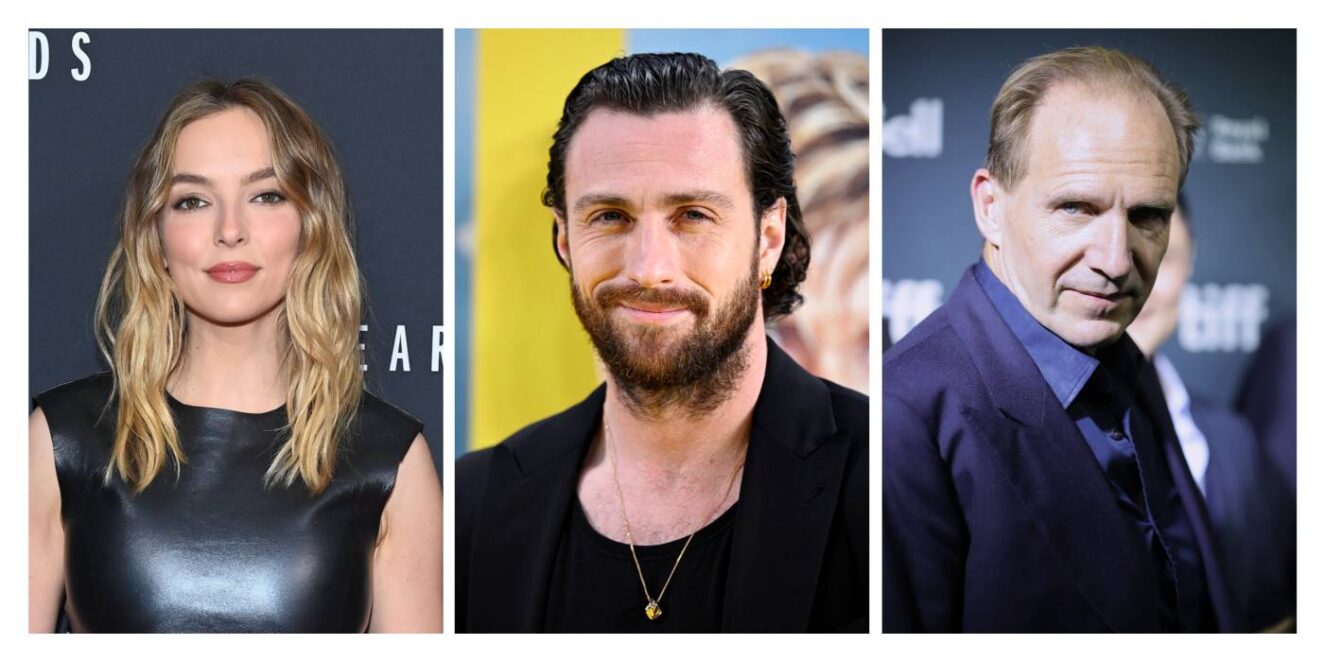
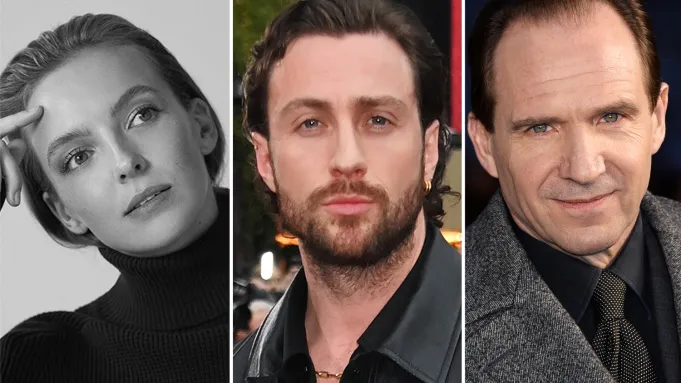
Boyle will direct the first movie but it’s unclear which role he will take on in the subsequent films. What is known is Candyman (2021) director Nia DaCosta is scheduled to direct the second film in this trilogy and that the third will be filmed immediately afterward. Whether DaCosta will direct both is still unclear.
Alex Garland is writing the scripts. Garland is having a successful time at the box office right now. He wrote and directed the current action/thriller Civil War which was just knocked out of the theatrical top spot by Radio Silence’s Abigail.
There is no word yet on when, or where, 28 Years Later will start production.
The original film followed Jim (Cillian Murphy) who wakes from a coma to find that London is currently dealing with a zombie outbreak.
'Civil War' Review: Is It Worth Watching?
Follow our new YouTube channel "Mysteries and Movies" here.
-
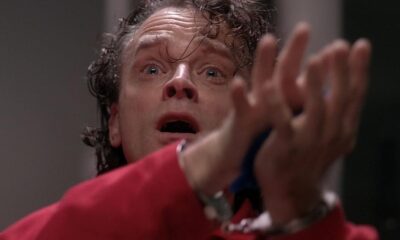
 News7 days ago
News7 days agoBrad Dourif Says He’s Retiring Except For One Important Role
-
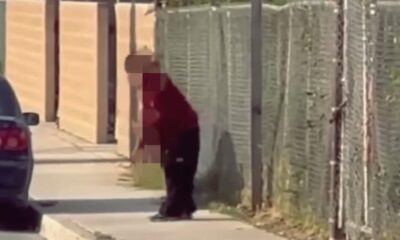
 Strange and Unusual7 days ago
Strange and Unusual7 days agoMan Arrested for Allegedly Taking a Severed Leg From Crash Site And Eating It
-
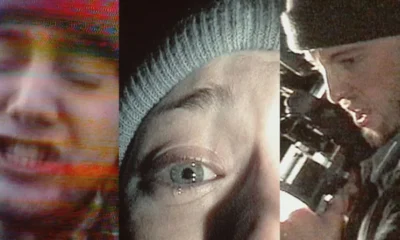
 News5 days ago
News5 days agoOriginal Blair Witch Cast Ask Lionsgate for Retroactive Residuals in Light of New Film
-
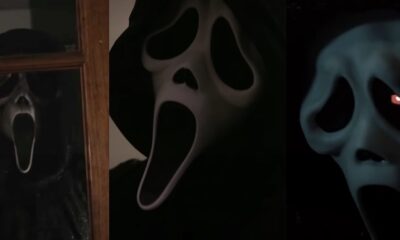
 Editorial7 days ago
Editorial7 days ago7 Great ‘Scream’ Fan Films & Shorts Worth a Watch
-
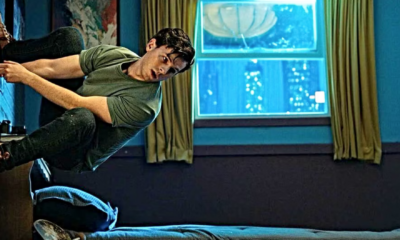
 Movies6 days ago
Movies6 days agoSpider-Man With a Cronenberg Twist in This Fan-Made Short
-
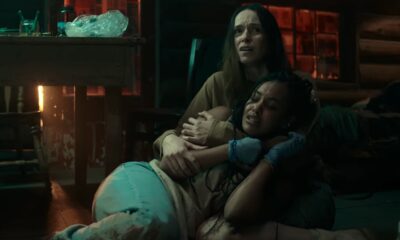
 Movies7 days ago
Movies7 days agoCannabis-Themed Horror Movie ‘Trim Season’ Official Trailer
-
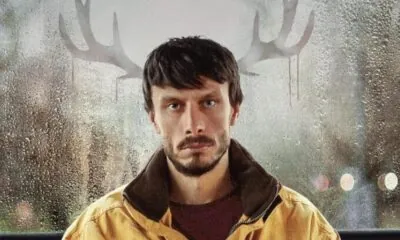
 News3 days ago
News3 days agoPerhaps the Scariest, Most Disturbing Series of The Year
-
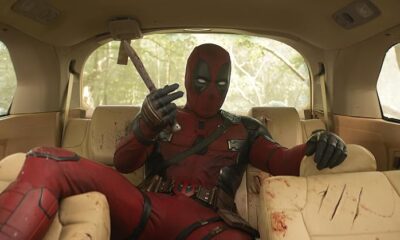
 Movies4 days ago
Movies4 days agoNew F-Bomb Laden ‘Deadpool & Wolverine’ Trailer: Bloody Buddy Movie
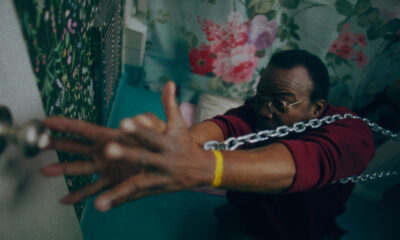

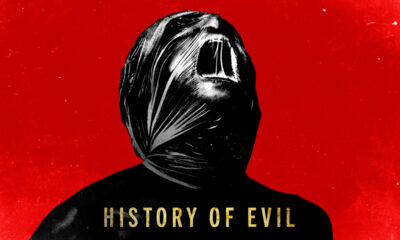

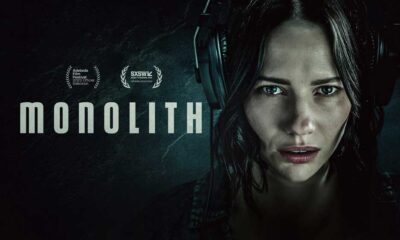


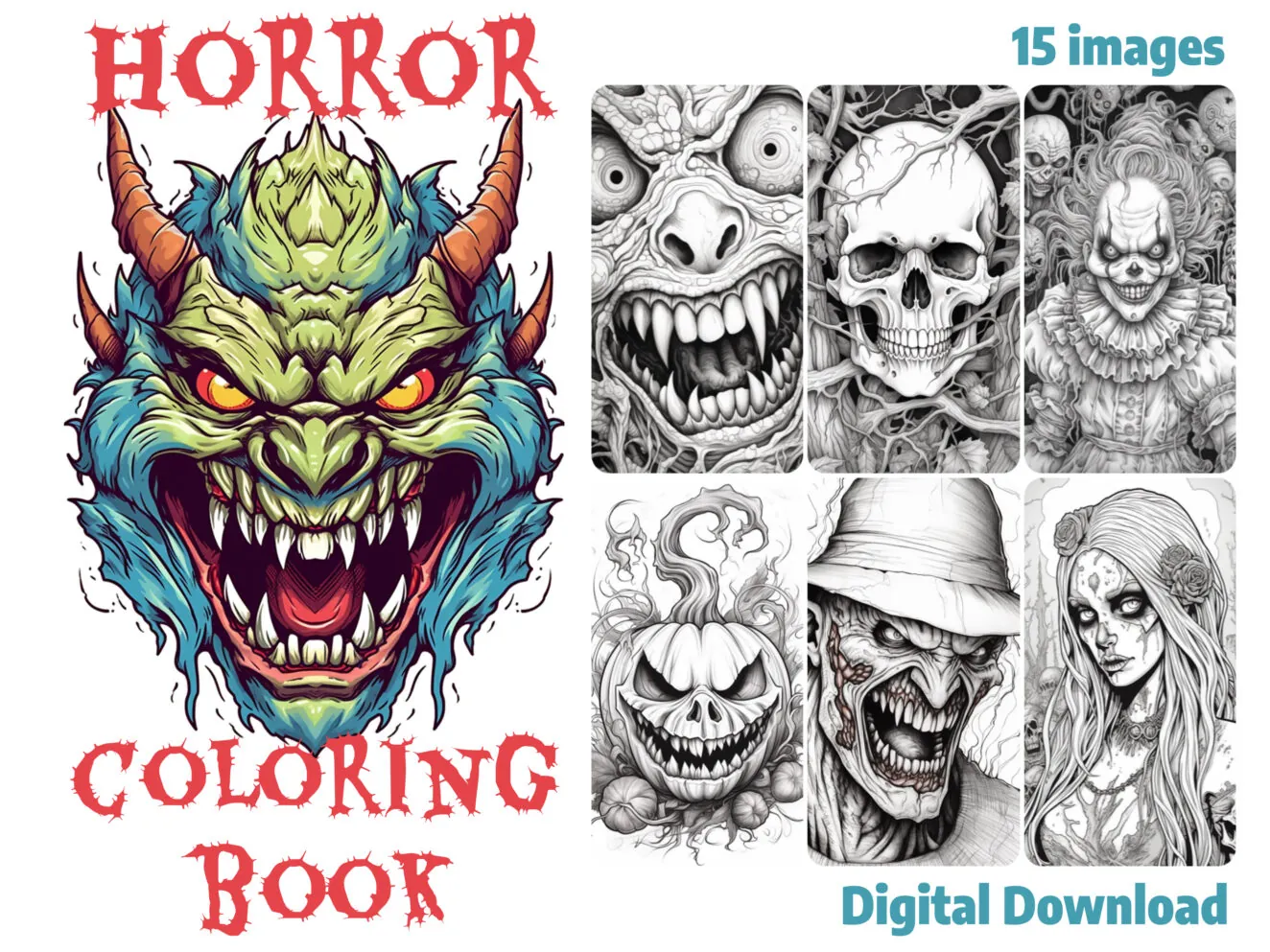
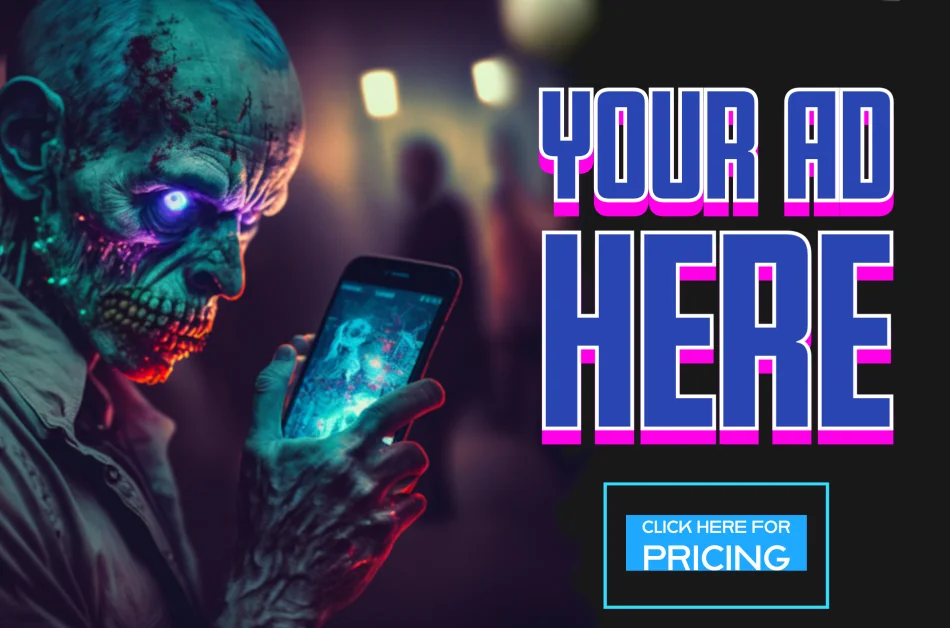



















You must be logged in to post a comment Login